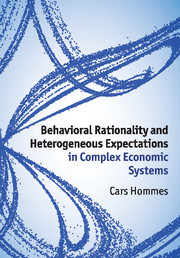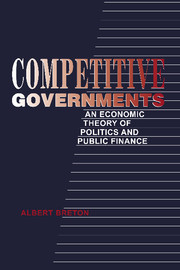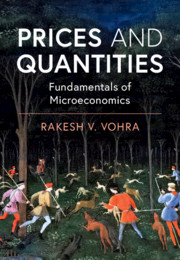Behavioral Rationality and Heterogeneous Expectations in Complex Economic Systems
£30.99
- Author: Cars Hommes, Universiteit van Amsterdam
- Date Published: October 2015
- availability: Available
- format: Paperback
- isbn: 9781107564978
£
30.99
Paperback
Other available formats:
Hardback, eBook
Looking for an inspection copy?
This title is not currently available on inspection
-
Recognising that the economy is a complex system with boundedly rational interacting agents, the book presents a theory of behavioral rationality and heterogeneous expectations in complex economic systems and confronts the nonlinear dynamic models with empirical stylized facts and laboratory experiments. The complexity modeling paradigm has been strongly advocated since the late 1980s by some economists and by multidisciplinary scientists from various fields, such as physics, computer science and biology. More recently the complexity view has also drawn the attention of policy makers, who are faced with complex phenomena, irregular fluctuations and sudden, unpredictable market transitions. The complexity tools - bifurcations, chaos, multiple equilibria - discussed in this book will help students, researchers and policy makers to build more realistic behavioral models with heterogeneous expectations to describe financial market movements and macro-economic fluctuations, in order to better manage crises in a complex global economy.
Read more- An introduction to nonlinear dynamics and complexity for economists and policy-makers
- Theories are illustrated by simple examples and economic applications
- More than 90 figures illustrate the complexity and richness of nonlinear dynamics
Reviews & endorsements
'Professor Hommes' work is a major contribution to the understanding of intertemporal economic fluctuations. In a world in which production and investment behavior is motivated by expectations of the future, the way those expectations are formed becomes of the utmost importance. These expectations lead to dynamic systems, and the author draws on the rich literature developed for the study of mechanical and gravitational phenomena. These lead to the emergence of very complex behavior in markets driven by expectations, especially when different economic agents have different modes of forming expectations from data. The study of this book will have a profound impact on the theoretical and empirical analysis of securities markets and other forms of investment.' Kenneth J. Arrow, Joan Kenney Professor of Economics and Professor of Operations Research, Emeritus, Stanford University, and Winner of the Nobel Prize in Economics, 1972
See more reviews'Cars Hommes has written an excellent book that is a combination of theory, economic modeling and economic experiments. The book is an outgrowth of a course on nonlinear economic dynamics that he has given mostly at the University of Amsterdam for the last 20 years.' Carl Chiarella, Head, Finance Discipline Group, University of Technology, Sydney
'Cars Hommes' excellent book puts us firmly back on the path that we should have followed had we heeded Poincaré's warnings and built our economic theory on the foundations that he laid. The book's careful formal analysis, empirical and experimental evidence provides a solid basis for understanding the volatile evolution of economies. It provides the framework for a better understanding of how economies do actually behave rather than how current economic theory says they should behave. This book could not have come at a more opportune moment.' Alan Kirman, Professor Emeritus of Economics, Université d' Aix-Marseille III, and Director of Studies, Ecole des Hautes Etudes en Sciences Sociales
'Assumptions about the homogeneity of individuals' expectations have limited economic modeling for some time. In this very complete book, Cars Hommes shows the reader how the world of heterogeneous expectations works in several different contexts. It distinguishes itself by covering theory along with empirical and experimental validation. Researchers interested in getting up to speed in this relatively new area of economics will find this book an excellent overview and tutorial.' Blake LeBaron, Abram L. and Thelma Sachar Chair of International Economics, Brandeis University
'Without doubt, rational expectations has been a powerful and useful assumption in pushing applied work forward in the last 40 years. But positing that agents have heterogeneous beliefs that deviate from the measure implied by a model opens up new possibilities that promise to allow us to resolve some of our many remaining puzzles about asset prices and quantities. Cars Hommes' book is a leading example of how productive this approach can be.' Thomas J. Sargent, W. R. Berkley Professor of Economics and Business, New York University, Senior Fellow, Hoover Institution, Stanford University, and Winner of the Nobel Prize in Economics, 2011
'Cars Hommes has written an exciting book that will help students, researchers and policy-makers to formulate their own realistic behavioral rationality models with heterogeneous expectations. I can highly recommend reading it. This book is undoubtedly also suitable for teaching nonlinear economic dynamics with a strong behavioral flavor at Master or PhD level. Even advanced Bachelor students should be able to learn some important lessons.' Journal of Economics and Statistics
Customer reviews
Not yet reviewed
Be the first to review
Review was not posted due to profanity
×Product details
- Date Published: October 2015
- format: Paperback
- isbn: 9781107564978
- length: 272 pages
- dimensions: 244 x 170 x 14 mm
- weight: 0.44kg
- contains: 93 b/w illus.
- availability: Available
Table of Contents
1. Introduction
2. Bifurcations and chaos in 1-D systems
3. Bifurcations and strange attractors in 2-D systems
4. The nonlinear cobweb model
5. The cobweb model with heterogeneous expectations
6. An asset pricing model with heterogeneous beliefs
7. Empirical validation
8. Laboratory experiments.-
General Resources
Find resources associated with this title
Type Name Unlocked * Format Size Showing of
This title is supported by one or more locked resources. Access to locked resources is granted exclusively by Cambridge University Press to lecturers whose faculty status has been verified. To gain access to locked resources, lecturers should sign in to or register for a Cambridge user account.
Please use locked resources responsibly and exercise your professional discretion when choosing how you share these materials with your students. Other lecturers may wish to use locked resources for assessment purposes and their usefulness is undermined when the source files (for example, solution manuals or test banks) are shared online or via social networks.
Supplementary resources are subject to copyright. Lecturers are permitted to view, print or download these resources for use in their teaching, but may not change them or use them for commercial gain.
If you are having problems accessing these resources please contact [email protected].
Sorry, this resource is locked
Please register or sign in to request access. If you are having problems accessing these resources please email [email protected]
Register Sign in» Proceed
You are now leaving the Cambridge University Press website. Your eBook purchase and download will be completed by our partner www.ebooks.com. Please see the permission section of the www.ebooks.com catalogue page for details of the print & copy limits on our eBooks.
Continue ×Are you sure you want to delete your account?
This cannot be undone.
Thank you for your feedback which will help us improve our service.
If you requested a response, we will make sure to get back to you shortly.
×






